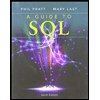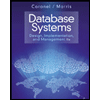Let's pretend the Student table in a university database is indexed by StudentID (the primary key), Major, Age, MaritalStatus, and HomeZipCode (all secondary keys). Assume the school needed a list of students from the 45462 zip code who are either over the age of 25, married, and majoring in MIS or computer science OR who are above the age of 25 and majoring in computer engineering and are single. How can indexes be used to restrict access to records that exactly match these parameters?
Let's pretend the Student table in a university database is indexed by StudentID (the primary key), Major, Age, MaritalStatus, and HomeZipCode (all secondary keys). Assume the school needed a list of students from the 45462 zip code who are either over the age of 25, married, and majoring in MIS or computer science OR who are above the age of 25 and majoring in computer engineering and are single. How can indexes be used to restrict access to records that exactly match these parameters?
Chapter2: Database Design Fundamentals
Section: Chapter Questions
Problem 11RQ
Related questions
Question
Let's pretend the Student table in a university
Expert Solution
This question has been solved!
Explore an expertly crafted, step-by-step solution for a thorough understanding of key concepts.
Step by step
Solved in 2 steps

Knowledge Booster
Learn more about
Need a deep-dive on the concept behind this application? Look no further. Learn more about this topic, computer-science and related others by exploring similar questions and additional content below.Recommended textbooks for you

A Guide to SQL
Computer Science
ISBN:
9781111527273
Author:
Philip J. Pratt
Publisher:
Course Technology Ptr

Database Systems: Design, Implementation, & Manag…
Computer Science
ISBN:
9781285196145
Author:
Steven, Steven Morris, Carlos Coronel, Carlos, Coronel, Carlos; Morris, Carlos Coronel and Steven Morris, Carlos Coronel; Steven Morris, Steven Morris; Carlos Coronel
Publisher:
Cengage Learning

A Guide to SQL
Computer Science
ISBN:
9781111527273
Author:
Philip J. Pratt
Publisher:
Course Technology Ptr

Database Systems: Design, Implementation, & Manag…
Computer Science
ISBN:
9781285196145
Author:
Steven, Steven Morris, Carlos Coronel, Carlos, Coronel, Carlos; Morris, Carlos Coronel and Steven Morris, Carlos Coronel; Steven Morris, Steven Morris; Carlos Coronel
Publisher:
Cengage Learning